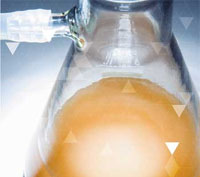Regular Line
Workshop Scientific Issues on Biofuels (May 24 and 25, 2010) Versão em português
 (foto: Eduardo Cesar/Pesquisa FAPESP)
(foto: Eduardo Cesar/Pesquisa FAPESP)
Producing energy in a sustainable way is one of the main challenges for mankind today
The IPCC 2007 Fourth Assessment of climate change science concluded that large reductions in the emissions of greenhouse gases, principally CO2, are needed very soon to prevent atmospheric concentrations from reaching unacceptable levels.
However, climate change is happening even faster than previously estimated; global CO2 emissions since 2000 have been higher than even the highest predictions, Arctic sea ice has been melting at rates much faster than predicted, carbon absorption by the land and ocean sinks has begun to slow sooner than expected, and oceans are acidifying at rates not seen for the last 65 million years. We may now be close to reaching a 'tipping point' for abrupt major climate changes.
Achieving a ~2°C target will depend on the immediate worldwide implementation of all currently available low carbon technologies.
The need for urgent action to address climate change is now indisputable.
A low carbon economy will require global collaboration and concerted actions including rapidly increased adoption of, and investment in, renewable energy technologies such as wind, geothermal, and solar energy, environmentally sustainable biofuels and wave power.
The workshop on Scientific Issues on Biofuels, organized by the Brazilian Academy of Sciences (ABC) and The São Paulo Research Foundation (FAPESP), will discuss the science of biofuels production and its sustainability. Biofuels may turn out to be important replacements for fossil fuel, but only if their production will be sustainable, not only in relation to the environment but also in relation to the production of other agricultural products essential for mankind.
ABC and IAC on Scientific Issues on Biofuels
During the IAP EC Meeting that took place in Canberra, Australia, in September 2007, the Royal Netherlands Academy of Sciences and the Union of German Academies presented a draft statement on Biofuels, to be approved in the next IAP-EC Meeting (Ottawa, September 2008). After discussing the document, the IAP-EC decided to create a working group, co-chaired by Prof Krieger (Brazil) and Prof. Rabbinge (The Netherlands), to revise the draft. This group worked on several versions of the document without reaching consensus. Finally, the co-chairs considered that extra efforts were needed to elaborate a proposal of high scientific quality, with the best scientific evidence aiming at providing sound scientific advice for the Society and for the Governments.
At the IAP General Assembly ,in London 2010, the Brazilian Academy of Sciences offered to host a Seminar that would be called “Scientific Issues on Biofuels” in May 2010, co-sponsored by the IAP. Ten Academies were invited to send representatives to participate at the Seminar, which results will be sent to the IAP EC. The EC will decide if the IAP will disseminate these results or to prepare a scientific based statement.
